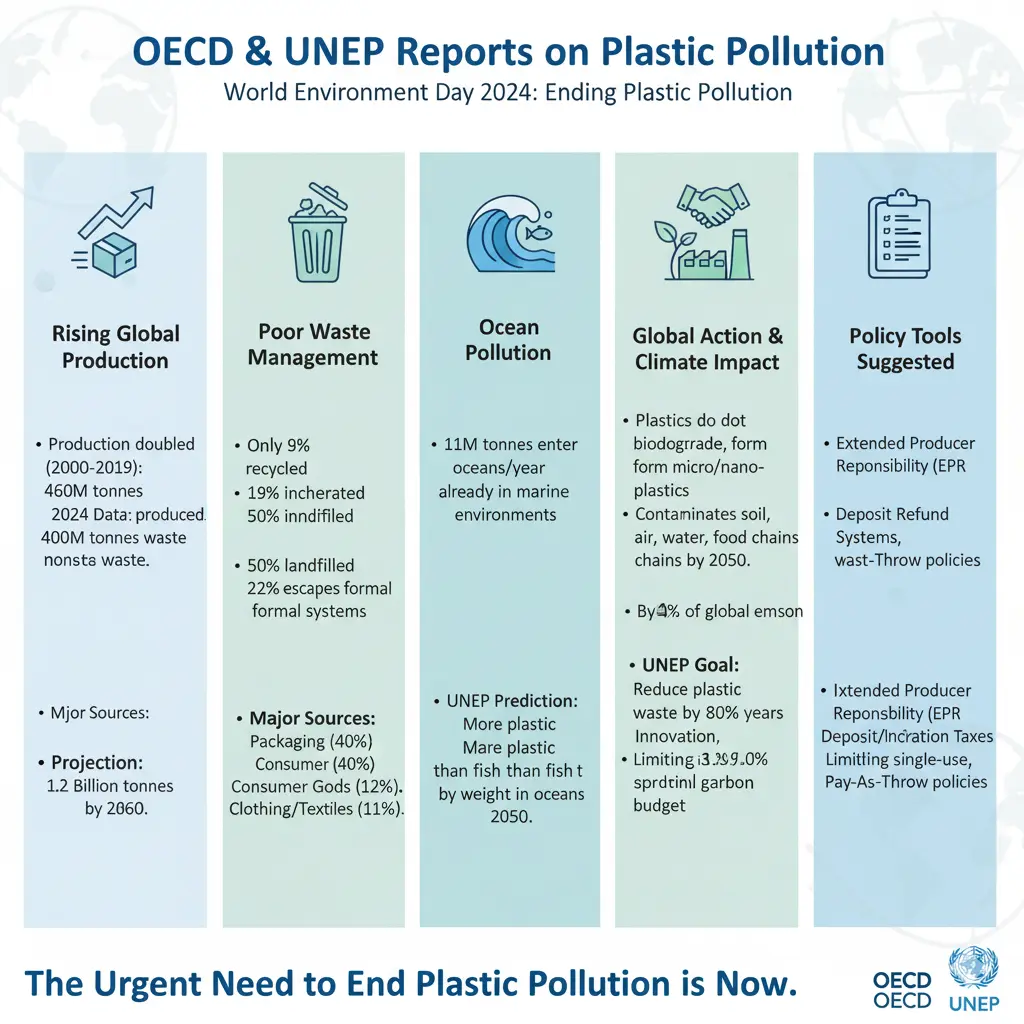September 15, 2025
Plastic Pollution Threat: 7 Key Insights from OECD & UNEP
OECD and UNEP Reports on plastic pollution
The issue of plastic pollution is in the news because World Environment Day 2024 (June 5) focused on “Ending Plastic Pollution”, highlighting the urgent need to address the rising global plastic crisis. It also coincides with alarming new data released by the OECD and UNEP, showing that plastic production and waste are increasing at unsustainable rates and could have catastrophic environmental, health, and socio-economic impacts if left unchecked.
Key Points: OECD and UNEP Reports on plastic pollution

1. Rising Global Plastic Production and Waste:
- Global plastic production doubled between 2000 and 2019, reaching 460 million tonnes.
- Plastic waste generation grew to 353 million tonnes in 2019.
- 2024 data:
- 500 million tonnes of plastic produced or used.
- 400 million tonnes of plastic waste generated.
Projection: By 2060, global plastic waste could almost triple to 1.2 billion tonnes.
2. Poor Waste Management:
- Only 9% of plastic waste is recycled.
- 19% is incinerated.
- 50% ends up in landfills.
- 22% escapes formal waste systems → enters rivers, oceans, open dumps, or is burned in pits.
Major sources of waste:
- Packaging: 40%
- Consumer goods: 12%
- Clothing and textiles: 11%
3. Ocean Pollution:
- 11 million tonnes of plastic enter the oceans each year.
- 200 million tonnes of plastic are already circulating in marine environments.
- UNEP prediction:
- By 2050, there could be more plastic than fish in the oceans by weight.
4. Environmental & Climate Impact:
- Plastics do not biodegrade, instead breaking into micro- and nano-plastics, contaminating:
- Soil, air, water, and food chains.
- Greenhouse Gas Contribution:
- Plastics account for 3.4% of global GHG emissions.
- By 2040, plastics could account for 19% of the total global carbon budget.
5. Global Action & Remedies:
UN Environment Assembly (UNEA-5, 2022):
- 193 UN member states agreed to create a legally binding international treaty to end plastic pollution.
UNEP Goal:
- Reduce plastic waste by 80% within 20 years through:
- International cooperation.
- Innovation and eco-friendly product design.
- Limiting single-use plastics.
- Improving waste management systems.
Policy Tools Suggested:
- Extended Producer Responsibility (EPR) schemes.
- Landfill and incineration taxes to promote recycling.
- Deposit refund systems.
- Pay-as-you-throw policies.
6. Call to Action:
Governments:
- Restrict plastic production to legal limits.
- Support recycled plastic production (currently only 6% globally).
Industry:
- Innovate sustainable alternatives and build markets for recycled plastics.
Citizens:
- Adopt greener, traditional alternatives to plastics.
- Reduce consumption of single-use plastics.
Media:
- Raise awareness about the dangers of plastic pollution and solutions.
October 6, 2025
September 24, 2025
September 23, 2025
September 22, 2025
